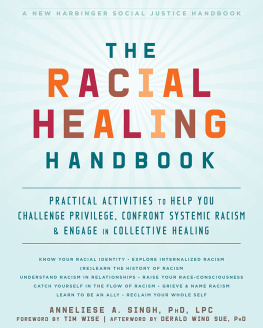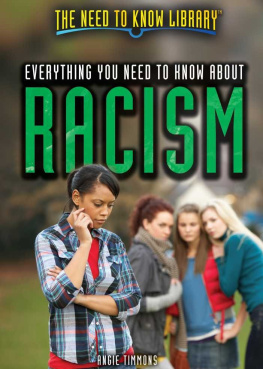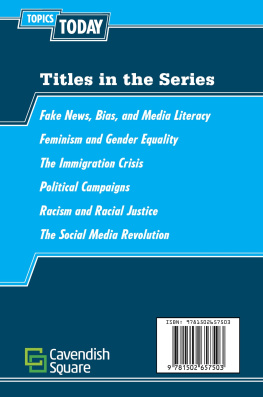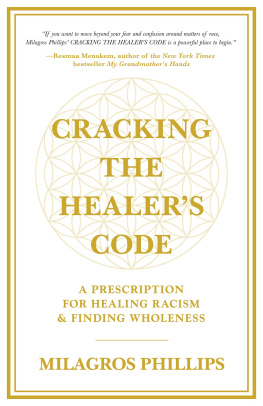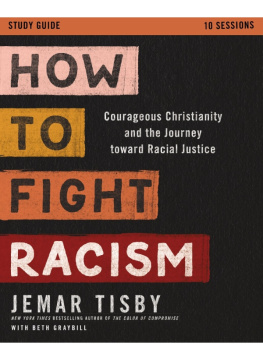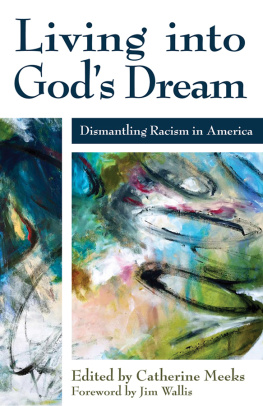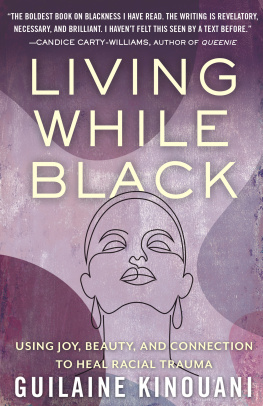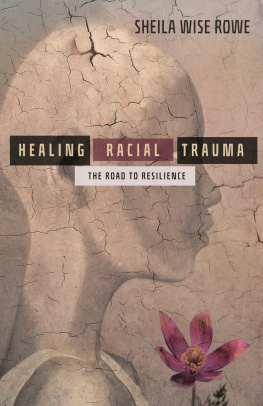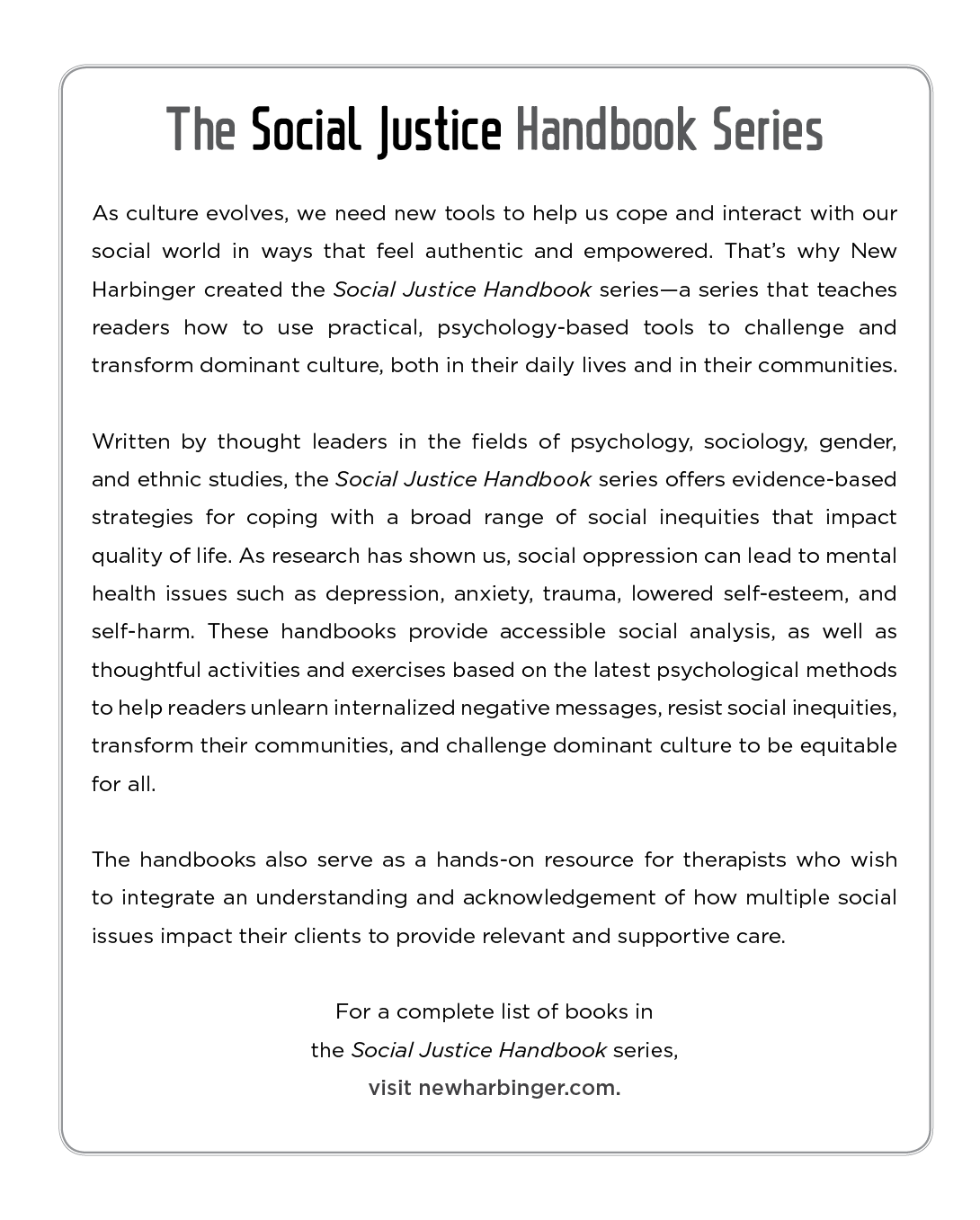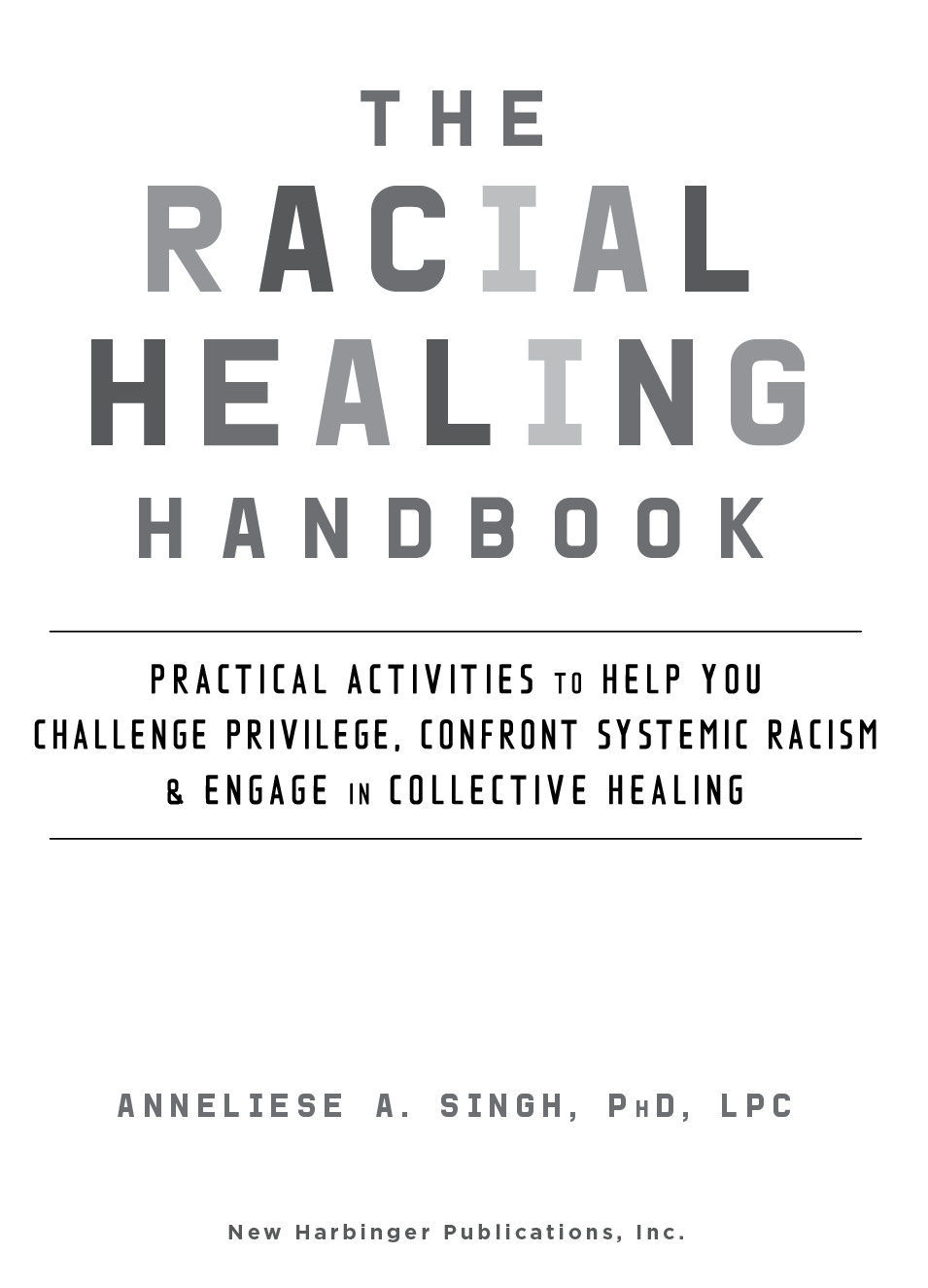In a political era where we are bombarded daily with reports of racism and discrimination, it is easy to feel helpless and withdraw. Anneliese Singhs workbook is a practical guide to actively engaging and participating in social justice on a personal and societal level. Singh draws on best practices, research, and advocacy to create pathways to restore hope in humanity and to create the self-efficacy needed to be a change agent. What a gift!
Edward Delgado-Romero, PhD , associate dean for faculty and staff services, professor and licensed psychologist, College of Education, University of Georgia
Racism is Americas original sin. It is woven into the fabric of this country, and is an inextricable part of this nations history. Racism is psychologically and spiritually damaging, yet the sad reality is that in the current political climate racism has been emboldened. Anneliese Singh has given us a desperately needed gift in this racial healing workbook. For those who are social justice activists, or just people who want to understand themselves as racial beings, Singhs workbook is a psychological guide and spiritual salve for facilitating our own racial healing. It is destined to become a classic!
Kevin Cokley, PhD , Oscar and Annie Mauzy Regents Professor for educational research and development, professor in the department of educational psychology and African and African diaspora studies, and author of the book The Myth of Black Anti-Intellectualism
This is the book youve been waiting for, even if you didnt know you were waiting for it! Anneliese Singh makes a racial healing path accessible, practical, and comprehensive for anyone willing to pursue it. This handbook is personal, straightforward, honest, and inviting, and honors the system of racism in all its complexity. It is the rare kind of book I can recommend to my family, my friends, my colleagues, my clients, and to myself. An important contribution to our individual and collective paths toward liberation!
Jen Willsea, MTS , Atlanta-based social justice and anti-racism facilitator, consultant, and coach
Race and healing? Not words you often see together! Yet Anneliese Singh has brought her gifts together as a healer, a scholar, a clinician, and an activist to weave a heartfelt and liberating book of hope. Whether youre White, a person of color, or multiracial, Singh invites us allthrough personal stories, reflection exercises, self-assessments, and an impressive integration of history and the social sciencesto engage in the lifelong practice of racial transformation for ourselves and our communities. This is a gift and a balm for the racial wounds we all carry!
Alvin N. Alvarez, PhD , professor in the department of counseling and dean of the college of health and social sciences at San Francisco State University, and coeditor of The Cost of Racism for People of Color
Anneliese Singhs The Racial Healing Handbook is a must-have resource for all educators and mental health workers, and for anyone interested in creating a more racially just world. Singh masterfully weaves together theory, empirical research, and narrative to inform her discussion of the key elements for racial healing for people of color and White individuals. Singhs strength is her ability to translate research into developmentally appropriate, practical activities that will stimulate deep reflection and action. As such, she offers a nice balance of cognitive, emotional, and behavioral exploration. I cant wait to use the handbook and practical exercises in my classes and my work with community members.
Helen A. Neville, PhD , professor in the department of educational psychology and African American studies at the University of Illinois at Urbana-Champaign; past president of the Society for the Psychological Study of Culture, Ethnicity, and Race; and coeditor of The Myth of Racial Color Blindness and The Cost of Racism for People of Color
Visit http://www.newharbinger.com/42709 for a downloadable clinicians guide and a downloadable reading group guide for this book.
Publishers Note
This publication is designed to provide accurate and authoritative information in regard to the subject matter covered. It is sold with the understanding that the publisher is not engaged in rendering psychological, financial, legal, or other professional services. If expert assistance or counseling is needed, the services of a competent professional should be sought.
In consideration of evolving American English usage standards, and reflecting a commitment to equity for all genders, they/them is used in this book to denote singular persons.
Distributed in Canada by Raincoast Books
Copyright 2019 by Anneliese A. Singh
New Harbinger Publications, Inc.
5674 Shattuck Avenue
Oakland, CA 94609
www.newharbinger.com
The figure Racial Identity Development in chapter 1 is adapted from the work of Marla Rowe Gorosh and Kathy McGrail and John and Joy Hoffman. Reproduced by permission of Marla Rowe Gorosh and Kathy McGrail.
Examples of Racial Microaggressions in chapter 6 is reproduced from Table 1: Examples of Racial Microaggressions (pp. 282283) in Sue, D. W., Capodilupo, C. M., Torino, G. C., Bucceri, J. M., Holder, A. M. B., Nadal, K. L., and Esquilin, M. (2007). Racial microaggressions in everyday life: Implications for clinical practice. American Psychologist, 62 (4), 271286.
Cover design by Sara Christian; Interior design by Michele Waters-Kermes; Acquired by Ryan Buresh; Edited by Rona Bernstein
All Rights Reserved
Library of Congress Cataloging-in-Publication Data on file
For my beloved, Lauren Lukkarila,
who supports me in every step of my own racial healing journey.
For Jasbir Singh, Diane Singh, and Ravi Singhyour courage is with me always.
For Priyanka Sinhayou are my dearest friend, mirror, and anchor on this racial healing journey.
To New Orleans and to Indiayou both taught me not only the brutal realities of racism, but also the pathways toward racial justice and healing.
To my fellow Sikhsmay we cultivate chardi kala and sarbhat da bhala in building a more racially just world.
Contents
Foreword
Confession time: I was latevery, very lateturning in this foreword. As in, a few hours before the passing of the absolute final, final deadline late.
And although I wouldnt normally think my tardiness necessary to mention at the outset of someone elses book, in this instance, the reason for it is entirely related to the subject matter of this important volume.
To be specific, for most of December 2018, my family and I were the recipients of an onslaught of hateful phone calls, texts, and tweets from white supremacists who managed to find and release our cell phone numbers and address to the general public and to threaten harm not just to myself but also to my wife and two daughters. Long story short, after much effort, we have weathered the storm, turned over the harassers information to the proper authorities, and taken the necessary measures to protect ourselves from future threats.
But the bigger question is about how we, as a society and a culture more broadly, can protect ourselves from the poison of white supremacy. Not just in its most blatant iterations, as with the kinds of twisted souls who have spent the better part of a month harassing my family, but even when it comes in a smoother, less obvious package, as it so often does. Or when it carries the power and authority of the state, as with disproportionate police violence or immigration enforcement against persons of color.

